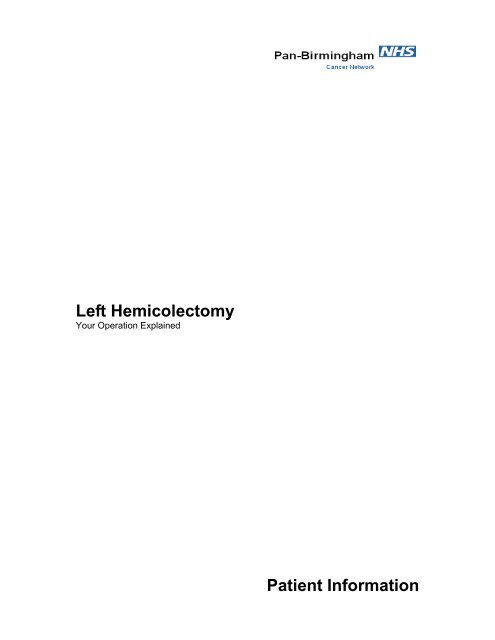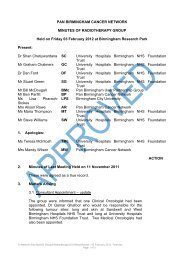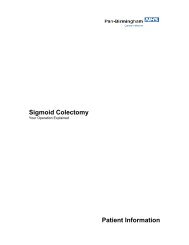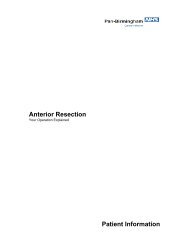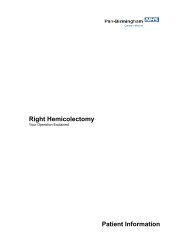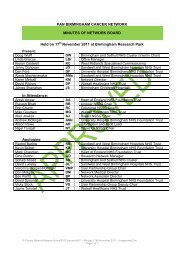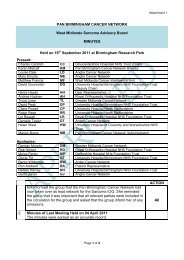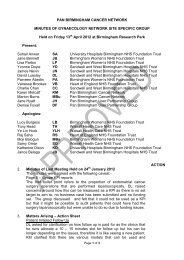Left Hemicolectomy - NHS Pan Birmingham Cancer Network
Left Hemicolectomy - NHS Pan Birmingham Cancer Network
Left Hemicolectomy - NHS Pan Birmingham Cancer Network
Create successful ePaper yourself
Turn your PDF publications into a flip-book with our unique Google optimized e-Paper software.
<strong>Left</strong> <strong>Hemicolectomy</strong><br />
Your Operation Explained<br />
Patient Information
Information for patients<br />
This leaflet tells you about the procedure known as a left hemicolectomy.<br />
It explains what is involved, and some of the common complications<br />
associated with this procedure that you need to be aware of. It does not<br />
replace the discussion between you and your doctor but helps you to<br />
understand more about what is discussed.<br />
The digestive system<br />
To understand your operation it helps to have some knowledge of how<br />
your body works (see diagram below).<br />
When food is eaten it passes from the mouth down the oesophagus<br />
(food pipe) into the stomach. Here it is broken down and becomes semiliquid.<br />
It then continues through the small intestine (small bowel), a<br />
coiled tube many feet long where food is digested and nutrients are<br />
absorbed.<br />
The semi-liquid food is then passed into the colon (large bowel), a wider,<br />
shorter tube, where it becomes faeces (stools). The main job of the<br />
colon is to absorb water into our bodies making the stools more solid.<br />
1
The stools then enter a storage area called rectum. When the rectum is<br />
full, we get the urge to open our bowels. The stools are finally passed<br />
through the anus (back passage) when going to the toilet.<br />
What is a left hemicolectomy?<br />
This operation is necessary to remove the area of bowel that is<br />
diseased. The operation removes a piece of your bowel shown in the<br />
diagram below.<br />
A cut will be made in your abdomen (tummy). The surgeon will remove<br />
the diseased area of bowel and a length of normal bowel either side of it.<br />
The two ends of healthy bowel are then joined by stitching or stapling<br />
them together (anastomosis). The wound on the abdomen will be closed<br />
either with clips or stitches. Any visible stitches or clips are removed<br />
after about seven to 12 days.<br />
It may also be necessary to have a temporary stoma to divert stools<br />
away from the surgical join in the bowel whilst it heals. A stoma is an<br />
opening onto the skin which is formed during surgery by stitching a<br />
section of the bowel onto the abdomen. Stools that come out of the<br />
stoma is collected in a bag that covers it. A colorectal nurse will discuss<br />
2
this with you beforehand and also mark a suitable site on your abdomen<br />
in case a stoma is necessary.<br />
Should a stoma be necessary, a second operation to reverse the stoma<br />
may be performed so the stools pass through your anus in the normal<br />
way again. The timing of reversal is variable but is often a few months<br />
after the first operation. The timing will be discussed with you by your<br />
surgeon and colorectal nurse.<br />
Before your operation, your surgeon and colorectal nurse will carefully<br />
explain the procedure involved, although details will vary according to<br />
each individual case. You will need to sign a consent form to confirm<br />
that you understand and agree to have surgery.<br />
<strong>Left</strong> hemicolectomy may be offered as laparoscopic surgery. This is also<br />
known as keyhole surgery. The aim of this type of surgery is to:<br />
• Reduce your hospital stay.<br />
• Reduce discomfort following surgery.<br />
• Minimise scarring.<br />
The risks remain the same as that of open surgery.<br />
What risks are there in having this procedure?<br />
Removing part of the bowel is a major operation. As with any surgery<br />
there are risks with the operation which include:<br />
• Anastomotic leak<br />
Sometimes the anastomosis (join in the bowel) leaks. Treatment with<br />
antibiotics and resting the bowel are generally enough, however, this<br />
may be a serious complication which needs further surgery and<br />
formation of a stoma.<br />
• Ileus (paralysis of the bowel)<br />
Sometimes the bowel is slow to start working after surgery which<br />
causes vomiting and delays you from eating and drinking normally in<br />
hospital. If this happens the bowel may need to be rested and a drip<br />
(a tube into a vein in your arm) is used to replace fluids (instead of<br />
drinking). In addition, you may need a nasogastric tube (tube in your<br />
nose which passes into your stomach) so that fluid in your stomach<br />
can be drawn off. This helps to prevent nausea and vomiting and<br />
remains in place until the bowel recovers.<br />
Sometimes further surgery is required but this will be discussed with<br />
3
you if it becomes necessary.<br />
After any major operation there is a risk of:<br />
• Chest infection<br />
You can help by practising deep breathing exercises and following the<br />
instructions of the physiotherapist. If you smoke, we strongly advise<br />
you to stop.<br />
• Wound infection<br />
There is a risk that your wound becomes infected. Antibiotics are<br />
given to help reduce the risk of this happening.<br />
• Thrombosis (blood clot in the leg)<br />
Major surgery carries a risk of clot formation in the leg. A small dose<br />
of a blood thinning medication will be given by injection until you go<br />
home. You can help by moving around as much as you are able and<br />
in particular regularly exercising your legs. You may also be fitted with<br />
some support stockings for the duration of your stay in hospital.<br />
• Pulmonary embolism (blood clot in the lungs)<br />
Rarely a blood clot from the leg can break off, and become lodged in<br />
the lungs.<br />
• Bleeding<br />
A blood transfusion may be needed during of after surgery. Very<br />
rarely, further surgery may be required.<br />
• Risk to life<br />
Surgery for bowel cancer is classified as major surgery. It can carry a<br />
risk to your life. Your surgeon will discuss this risk with you.<br />
Most people will not experience any serious complications from their<br />
surgery. However, risks do increase with age and for those who already<br />
have heart, chest or other medical conditions such as diabetes or for<br />
those who are overweight or smoke.<br />
What are the benefits of this procedure?<br />
The operation aims to remove the diseased bowel.<br />
In most cases this will give you the best chance of a cure or significant<br />
improvement in your bowel problems. Your surgeon will discuss this<br />
with you in more detail.<br />
4
What are the alternatives?<br />
If the treatment has been recommended by your surgeon as the best<br />
treatment, not having this surgery may lead to further worsening of your<br />
health. Depending upon what is wrong with you, you may develop a<br />
blockage of the bowel, leakage from the bowel into the abdomen or an<br />
abscess all of which can be life threatening. If you have cancer the<br />
longer it remains the more likely it will spread and be incurable.<br />
For most of the conditions where this surgery is advised the only<br />
alternative is medical treatment with drugs. Where there is a cancer of<br />
the bowel, drug treatment alone will not cure the disease. Your surgeon<br />
will discuss any queries you may have.<br />
What are the consequences of treatment?<br />
After any major bowel operation the function of the bowel can change.<br />
You may experience:<br />
• Difficulty controlling wind.<br />
• Urgency or difficulty with bowel control.<br />
• Loose stools or diarrhoea.<br />
In most people, these improve with time but can take many months to<br />
settle down. You may sometimes need medication to help control your<br />
bowel. Please do not hesitate to contact your colorectal nurse for<br />
advice.<br />
Before the operation<br />
While you are waiting for your operation, it is important you try to prepare<br />
yourself physically. If you can, try and eat a well-balanced diet including<br />
meat, fruit and vegetables. Take gentle exercise such as walking and<br />
get plenty of fresh air. If you smoke, we strongly advise you to stop.<br />
Pre-admission clinic<br />
To plan your operation and stay in hospital you may be asked to attend<br />
the hospital for a health check a week or two before your admission.<br />
This can take about two hours. If you are taking any medications please<br />
bring them with you.<br />
A doctor or nurse will listen to your chest, check your blood pressure and<br />
may send you for other tests, for example, a chest X-ray and an ECG<br />
(electrocardiograph – a tracing of your heart). This information will help<br />
the anaesthetist plan the best general anaesthetic for you. Blood will<br />
also be taken to check for any abnormalities so that these can be<br />
corrected before your operation.<br />
5
A nurse may also ask questions relating to your health and to your home<br />
circumstances. If you live alone and have no friends or family to help<br />
you, please let us know and we will try and organise some help or care<br />
for you. A social worker may come and discuss these arrangements with<br />
you.<br />
Preparing for your operation<br />
There are a number of different ways to prepare your bowel for the<br />
operation. Your doctor will discuss which option is best for you:<br />
• You may be asked to follow a special diet for a few days.<br />
• You may need to take a mild laxative for a couple of days.<br />
• You may need a stronger laxative the day before surgery.<br />
• You may be given supplements drinks.<br />
• You may be given an enema on the morning of your operation.<br />
• You may not need any of the above.<br />
It is important that you drink plenty during this time to prevent<br />
dehydration. Unless you are advised otherwise, you must stop eating<br />
six hours before your surgery and can then drink clear fluids (such as<br />
water or squash) until two hours before your surgery. This is to allow<br />
your stomach to empty and prevent vomiting during the operation. Any<br />
important medication needed within two hours of surgery may still be<br />
given with a small amount of water.<br />
Pain relief will be discussed with you by your anaesthetist. You may be<br />
given analgesia (painkillers) through an epidural (tube in your back) or<br />
through a drip in your arm in the form of a PCA (patient controlled<br />
analgesia) hand held pump. This means you control the amount of<br />
painkiller you require. If you would like to talk about this further, please<br />
ask the ward staff to contact one of the pain management nurses.<br />
A nurse will take you to theatre. Your operation will usually take between<br />
two and four hours.<br />
After your operation<br />
Immediately after surgery you may have a number of tubes attached to<br />
your body. You may have:<br />
• An intravenous infusion (drip tube), usually in your arm to feed you<br />
with fluids and often used to give drugs as well.<br />
• A catheter (tube) in your bladder to drain urine.<br />
• A tube, either in your arm (PCA) or in your back (epidural), slowly<br />
releasing painkillers.<br />
6
• Drainage tubes at the site of the operation to clear away any oozing<br />
fluids around the operation site inside.<br />
• Continuous oxygen by a face mask or small tube placed to your nose.<br />
Most of the tubes are put in place while you are under anaesthetic. Over<br />
a period of two to three days many or all of these tubes will be removed.<br />
People recover from surgery at different rates. The average stay in<br />
hospital is four to eight days but you may need to stay in longer. This<br />
will be discussed with you by your surgeon or colorectal nurse.<br />
About two to three weeks after your surgery a report from histopathology<br />
(examination under the microscope) on the piece of bowel removed<br />
during the operation will be sent to your surgeon. Depending on the<br />
results, further treatment may be offered, the details of which will be<br />
discussed with you. If there is an option for further treatment such as<br />
chemotherapy, an appointment will sometimes be made directly with an<br />
oncologist (cancer specialist).<br />
When can I start to eat and drink?<br />
Your bowel function may rapidly return to normal. Most patients should<br />
be able to have a drink when they wake and should be allowed to eat<br />
soon after.<br />
If you have any questions about your diet, please ask your colorectal<br />
nurse who can advise you. Eating a balanced healthy diet after your<br />
surgery will help your recovery. You will be given additional supplement<br />
drinks to make sure you are getting all the energy and nutrients you<br />
need.<br />
Discharge home<br />
Following your operation you may feel tired and weak, but as full<br />
recovery may take several months, there is no need to stay in hospital.<br />
Many people report that they feel better sooner at home. However, it will<br />
be necessary to make sure that there is someone to help with getting<br />
meals, cleaning your home and shopping.<br />
For the first week or so at home you may find that you tire easily. Try to<br />
alternate light activity with periods of rest. A short rest in the day is often<br />
helpful during the first two to three weeks after being home. It is unwise<br />
to stay in bed for too long though as this slows down the circulation of<br />
the blood and increases the risk of developing a thrombosis.<br />
Try to take some gentle exercise, like walking around the home or<br />
garden.<br />
For the first six weeks do not lift anything heavy such as shopping or wet<br />
7
washing, or do anything strenuous like digging the garden or mowing the<br />
lawn.<br />
You should not drive until you can safely do an emergency stop. You<br />
may wish to consult your GP before driving again. It is also advisable to<br />
check your car insurance policy, as there may be a clause in it about<br />
driving after operations.<br />
You may feel some pain and ‘twinges’ around your wound for several<br />
months. This is normal as it takes a while for full healing to take place.<br />
Taking a mild painkiller regularly will help you feel better and aid your<br />
recovery. If the pain does not seem to improve or you are worried,<br />
contact your GP or Colorectal Nurse.<br />
The length of time between your return to work following this type of<br />
surgery will depend upon the type of work you do. Ask your GP or<br />
surgeon for advice.<br />
You may resume sexual activity when it is comfortable for you. If you<br />
are unsure, please speak to your GP, surgeon or colorectal nurse.<br />
Within a few weeks you will normally be sent an appointment to see your<br />
surgeon. If the results on the piece of bowel removed during the<br />
operation are not available to give to you before you go home, an earlier<br />
outpatient appointment may be arranged.<br />
Support groups:<br />
B Friend Walsall Bowel <strong>Cancer</strong> Support Group<br />
The Crossing at St Pauls<br />
Darwall Street<br />
Walsall, WS11DA<br />
This group meets bi-monthly. For more information contact the<br />
colorectal nursing service on 01922 656300 (answer machine service) or<br />
bleep the colorectal nurse specialists via the switchboard on 01922<br />
721172.<br />
Beating Bowel <strong>Cancer</strong><br />
Beating Bowel cancer provide medical advice to patients through a<br />
specialist nurse advisor line on 08450 719301 or email<br />
nurse@beatingbowelcancer.org<br />
Website: http://www.beatingbowelcancer.org/<br />
Patient Voices<br />
8
The Patient Voices Group is part of Beating Bowel <strong>Cancer</strong> and is the<br />
only UK national patient-to-patient network for people with bowel cancer.<br />
The group has also expanded to include close relatives of bowel cancer<br />
patients. Members of the group are willing to help in a number of ways<br />
including patient to patient support, raising awareness, and fundraising.<br />
General enquiries: 08450 719301<br />
Local sources of further information<br />
You can visit any of the health/cancer information centres listed below:<br />
Heart of England <strong>NHS</strong> Foundation Trust<br />
Health Information Centre<br />
<strong>Birmingham</strong> Heartlands Hospital<br />
Bordesley Green<br />
<strong>Birmingham</strong> B9 5SS<br />
Telephone: 0121 424 2280<br />
<strong>Cancer</strong> Information and Support Centre<br />
Good Hope Hospital<br />
Rectory Road<br />
Sutton Coldfield B75 7RR<br />
Telephone: 0121 424 9486<br />
Sandwell and West <strong>Birmingham</strong> Hospitals <strong>NHS</strong> Trust<br />
The Courtyard Centre<br />
Sandwell General Hospital (Main Reception)<br />
Lyndon<br />
West Bromwich B71 4HJ<br />
Telephone: 0121 507 3792<br />
Fax: 0121 507 3816<br />
University Hospital <strong>Birmingham</strong> <strong>NHS</strong> Foundation Trust<br />
The Patrick Room<br />
<strong>Cancer</strong> Centre<br />
Queen Elizabeth Hospital<br />
Edgbaston<br />
<strong>Birmingham</strong> B15 2TH<br />
Telephone: 0121 697 8417<br />
Walsall Primary Care Trust<br />
<strong>Cancer</strong> Information & Support Services<br />
Challenge Building<br />
Hatherton Street<br />
Walsall WS1 1YB<br />
Freephone: 0800 783 9050<br />
9
About this information<br />
This guide is provided for general information only and is not a substitute<br />
for professional medical advice. Every effort is taken to ensure that this<br />
information is accurate and consistent with current knowledge and<br />
practice at the time of publication. We are constantly striving to improve<br />
the quality of our information. If you have a suggestion about how this<br />
information can be improved, please contact us via our website:<br />
http://www.birminghamcancer.nhs.uk.<br />
This information was produced by <strong>Pan</strong> <strong>Birmingham</strong> <strong>Cancer</strong> <strong>Network</strong> and<br />
was written by Consultant Surgeons, Clinical Nurse Specialists, Allied<br />
Health Professionals, Patients and Carers from the following Trusts:<br />
Heart of England <strong>NHS</strong> Foundation Trust<br />
Sandwell and West <strong>Birmingham</strong> <strong>NHS</strong> Trust<br />
University Hospital <strong>Birmingham</strong> Foundation Trust<br />
Walsall Hospital <strong>NHS</strong> Trust<br />
We acknowledge the support of Macmillan in producing this information.<br />
© <strong>Pan</strong> <strong>Birmingham</strong> <strong>Cancer</strong> <strong>Network</strong> 2010<br />
Publication Date: June 2010<br />
Review Date: June 2013<br />
The diagrams were provided courtesy of Northern Ireland <strong>Cancer</strong><br />
<strong>Network</strong>.<br />
10


